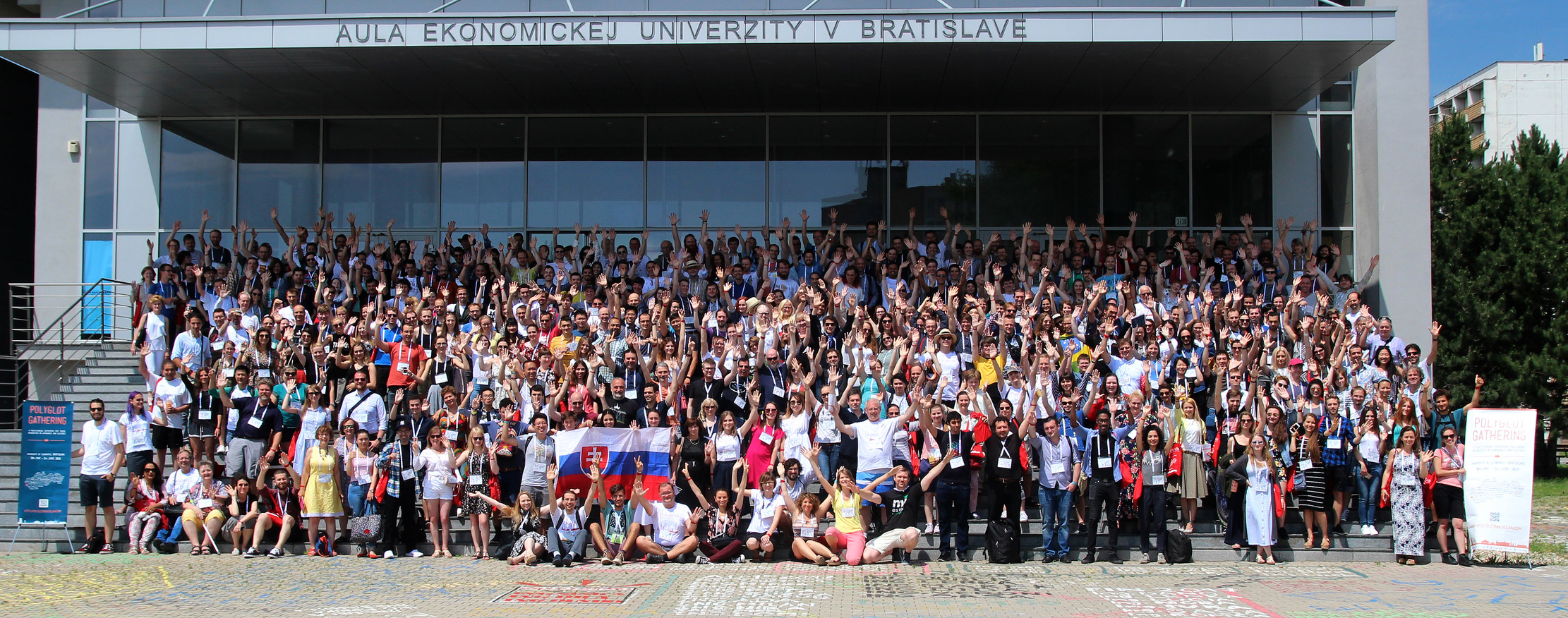From 29 May to 2 June 2019, Bratislava was flooded with hundreds of polyglots from around the world, coming to our capital to participate in Polyglot Gathering. The meeting was held for the third time at the University of Economics in Bratislava and this year, more than 600 admirable people from more than 60 countries took part in it.
Polyglot Gathering (www.polyglotbratislava.com) is an informal, multi-language annual event for polyglots. It was born in Berlin in 2014 and moved to Slovakia in 2017 after three years of its existence. For the third time this year, Bratislava will become one of the most multi-lingual cities in the world for the third time—participants of the event can speak more than 120 different languages.

The main organizer of this inspiring event is Edukácia@Internet, a civic association standing behind many successful language learning sites. The partner of the event is the University of Economics in Bratislava, represented by the Faculty of Applied Languages.
Worldwide known polyglots will meet to share their knowledge of foreign language learning. Among them is Richard Simcott, who can speak more than 30 languages and is one of the most recognized contemporary polyglots. His lecture will be dedicated to the "dark art" of multilingualism that will help you learn a foreign language in a relatively short time.
The meeting started with an official opening on Wednesday evening, followed by a program full of games and icebreaking activities to get the participants to know each other and break the communication barriers.
Central to the 5-day event were lectures and workshops of polyglots themselves on various topics related to languages and language learning presented in one of the world languages. Besides "classic" topics that appeared every year, the programme has included a lecture entitled "A New, Bold World of Learning through the Internet", "The Four Principles of Fluency" as well as "Esperanto Crash Course in 100 Minutes".
The program also included a panel discussion on the topic "Language hegemony—Is there a Way to Avoid It?”, which was dedicated to discussion about (not only) indigenous languages that die out of the dominance of world powers’ languages. It was in 2019 that UNESCO declared the International Year of Indigenous Languages! The program was enriched by discussions on the following topics: “Do You Want to Learn a Minority Language with a Lack of Materials? No problem”, “The Potential Impact of a Foreign Language on Self-Perception, Our Values and the Expression of our Personality—Exploring Evidence” and “Perfect Life of a Polyglot—How to Make a Living by Foreign Languages ”. Brain Loo Soon discussed linguistic hegemony in his lecture "Has English Become a Language Tyrant of the 21st Century" together Professor Federico Gobbo who presented his lecture "Multilingualism in the EU after Brexit—Challenges and Opportunities". Organizers of the event Peter Baláž, coordinator of the association E@I and VEGAN and polyglot Jitka Vršovská are saying: “Languages in today's global world are very important—their knowledge is not only an advantage on the labour market (to what the knowledge of languages is, unfortunately, often reduced), but also the possibility of establishing a dialogue with others (people, cultures), understanding the deeper view of the world and expanding one’s horizons, becoming more tolerant and more receptive. That is why we are very pleased that we can organize this world-class event which can help to understanding in the world (which we now need more than ever). It is no coincidence that Esperanto speakers has created and continue to organize this event—it is the use of the international neutral language Esperanto that enables people to be very receptive to the themes of linguistic democracy, discrimination or ecology, and then willing to discuss these issues in order to bring an improvement.
The organizers prepared interesting activities for the participants. This year's novelty was a course of Czech, Slovak, Hungarian and German, allowing participants to immerse themselves in the culture and learning of these languages in the country where it is spoken before the event itself. Also new was the event "Pecha Kucha" and networking night, which enabled participants to get to know each other on a professional basis and to establish work partnerships. For those who do not like to learn sitting and listening, workshops are prepared during which participants could acquire sign language basics, dance in foreign languages with the PC game Vortoj, relax their minds with yoga exercises or learn how to order sushi in Japan. Also worth mentioning is a karaoke evening and a culinary festival, where participants will be able to taste tastes from all over the world (of course, the Slovakia’s table as a hosting country was, as usual, be the richest one) and have fun together. For now, this was the last time the event was held in Slovakia. The main aim of the organizers had been to create a lot of opportunities for participants in Bratislava to meet other people who love languages and to make new friends. The event was held under the auspices of the Slovak Commission for UNESCO, as well as Martina Lubyová, Minister of the Education, Youth and Sports of the Slovak Republic. The patronage was also held by the Mayor of Bratislava, Matúš Vallo, Juraj Droba, President of the Bratislava Self-governing Region, and Ferdinand Daňo, Rector of the University of Economics.
In addition to this language-oriented event, Edukácia@Internet is planning to organize two major international linguistic-oriented events: the Esperanto Summer School (12-20 July, Nitra) and the second year of the first language festival in Slovakia - LingvaFest'2019 (26 – 27 September, Bratislava) whose main partner this year is the Representation of the European Commission in Slovakia.